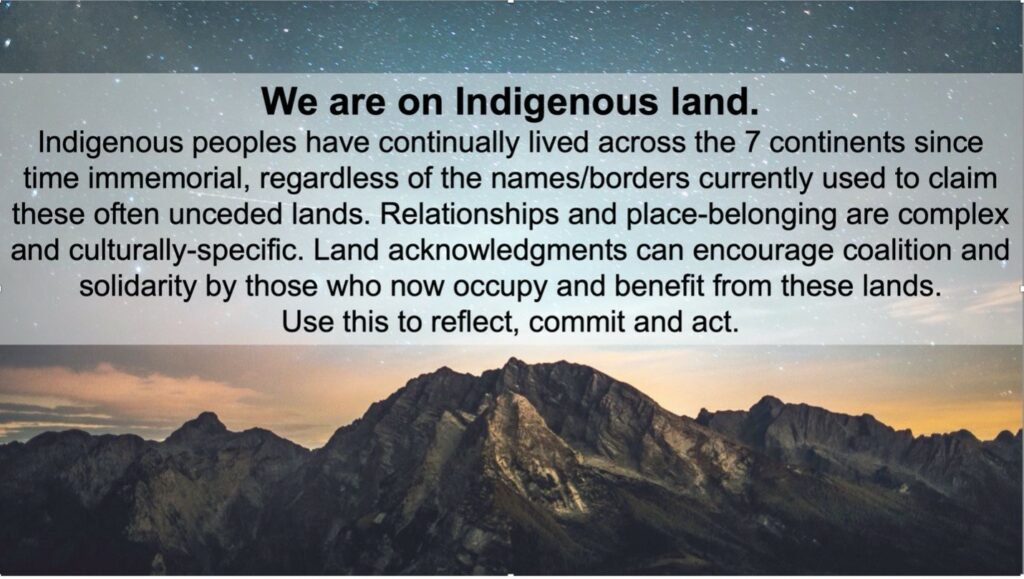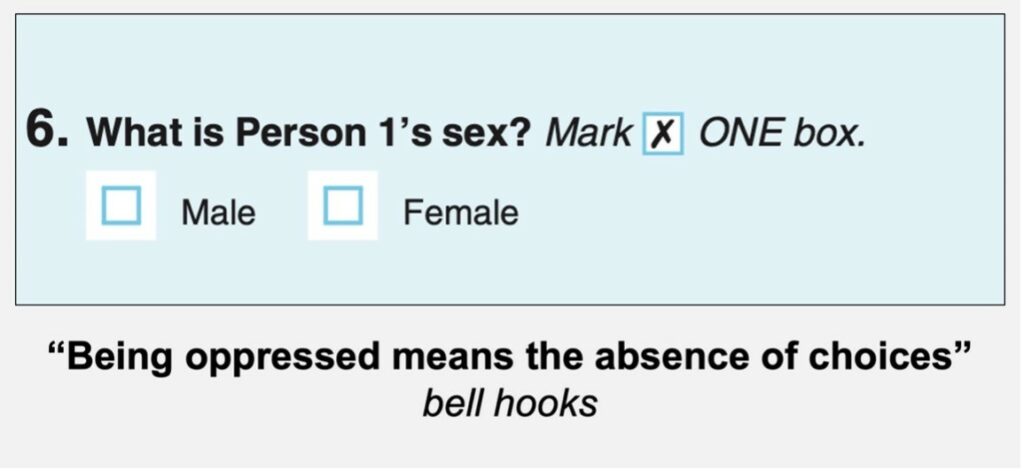Hello! We are Esrea Perez-Bill (she/her/they/them) with the EDIT Program at Northwestern University and Michael Petillo (he/him/they/them) with CES Partnership, LLC. We are emerging evaluators and creative researchers inviting you to coalition in radical solidarity with us against the othering/erasure of LGBTQ2S+ people (title invoking Gil Scott-Heron).

Learn about land acknowledgement and the Indigenous lands that you are on
Who determines who is “other?”
By definition, the “other” doesn’t meet the “standard.” But who and what defines that measurement? The evaluation “standard” is rooted in a settler-colonial, White, male, heteronormative, ciscentric, able-bodied, Western science paradigm. Rigid State surveillance systems rely on simplification and assimilation when faced with complexity/diversity, like the U.S. Census 2020 binary sex question. Why? Identities outside of settler-colonial-defined “civilized sexualities” are read as excess or dangerous, necessitating erasure that misrecognizes the multiplicity of LGBTQ+ and Two-Spirit peoples.

“Othering” results in erasure
Statecraft can use oppression/violence against “othered” bodies deemed “consumable” and thus erasable or “non-grievable” to develop/enforce State systems. Police violence against Black, trans, and gender non-conforming peoples criminalizes them, which encourages anti-LGBT state bills “for protection.” Aware of this vulnerability, survey participants’ non-responsiveness can represent statecraft resistance/self-protection from becoming a publicly “othered” body (spectacle), something that evaluators who assume “there aren’t any queer or TGNB people here” miss. An “other” category, such as driver’s licenses’ third “X” gender options, still forces assimilation through politics of respectability and still misaligns with normative binary systems, such as prisons.
Investment in decolonized evaluation requires changing how we read/understand diverse bodies, including an LGBTQ2S+ inclusive paradigm shift. Reframing social justice evaluation through radical accompliceship/co-conspiracy with LGBTQ2S+ people creates space for multifaceted liberation and self-authorship and practicing mutual aid.
Lesson to Learn:
Beware of State surveillance and LGBTQ+ oppression disguised as reform. A case study is the prison industrial complex, which disproportionately incarcerates Black, Brown, Indigenous, Latinx, and LGBTQ2S+ folks. Carceral state logic informs popular prison/policing alternatives, such as electronic monitoring, mental health and substance ab/use facilities, and sex work diversion programs that oppress LGBTQ+ and BIPOC peoples. Adopting a philosophy of abolition pushes us not only to reject and dismantle harmful systems, but to build in their place a loving, healthy, supportive world.
Cool Tricks:
- Don’t be cool. Be a co-conspirator.
- Question evaluator (and evaluand) biases when engaging sex, sexual orientation, and gender identity in demographic data
- Join the collective shift to resist harm/violences targeting LGBTQ2S+ communities.
- Center abolition and shared liberation within social justice evaluation.
- “Solidarity is Not Charity.” Think beyond the philanthropic industrial complex. Redistribute evaluation resources.
Call to Action:
Commit to 3 Actions over the next year. Here are some ideas:
- Find ways to support local LGBTQ2S+ organizations, community organizers, and individuals.
- Read up on LGBTQ2S+ evaluation! Select a number of books, articles, podcasts, or webinars. Start a reading/viewing group.
- Learn at least 1 new anti-oppressive framework that you can apply to your evaluation work.
How can we divest from State surveillance/oppression, and invest in LGBTQ2S+ communities?
How can we show up for LGBTQ2S+ communities every day?
The American Evaluation Association is hosting LGBT Issues TIG Week with our colleagues in the Lesbian, Gay, Bisexual & Transgender Issues Topical Interest Group. The contributions all this week to AEA365 come from our LGBT TIG members. Do you have questions, concerns, kudos, or content to extend this AEA365 contribution? Please add them in the comments section for this post on the AEA365 webpage so that we may enrich our community of practice. Would you like to submit an AEA365 Tip? Please send a note of interest to AEA365@eval.org. AEA365 is sponsored by the American Evaluation Association and provides a Tip-a-Day by and for evaluators. The views and opinions expressed on the AEA365 blog are solely those of the original authors and other contributors. These views and opinions do not necessarily represent those of the American Evaluation Association, and/or any/all contributors to this site.
